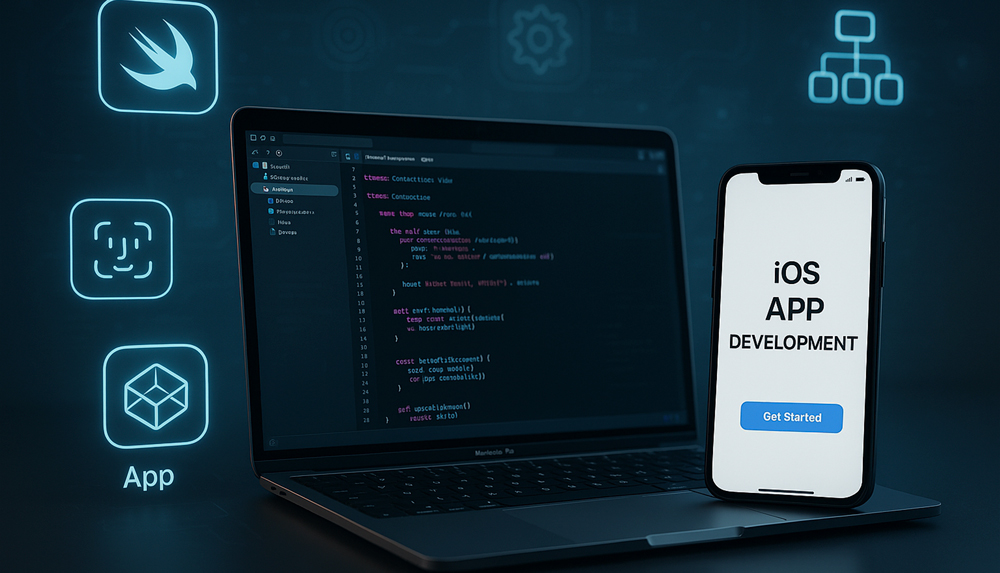Whether it is a business or the person behind it, an iOS app is likely to be a key to success of its digital strategy in the mobile-first world of 2025. The ecosystem of Apple which is symbolized by superior user experience, strong security, and a loyal following makes it an ecosystem with unrivaled possibilities in reaching a high-value audience. Be it a smooth e-commerce service, a futuristic health/medical app, or an interactive portal to the entertainment World, iOS app development is a smart move.
The popularity of quality iOS applications has caused the mushrooming of specialized iOS apps building services all over the world. India in specific has become a hub of mobile app development where many companies are competent providers of superior iOS app development expertise at reasonable cost. This comprehensive material is going to explore the critical requirements, notable iOS app development advantages, and a bright future of iOS software development.
iOS App Development: Opportunities, Advantages, Future
Features of iOS Applications of 2025
Contemporary applications built on iOS can be characterized by their flawless embedded interoperability with the Apple ecosystem, an enhanced user interface, and technological innovations. Some of the main features are hereby listed:
Usable and Non-confusing User Interface (UI) & User Experience (UX):
-
Human Interface Guidelines (HIG): Compliance with HIG allows the apps to have the same appearance, feel, and navigation in the same way, which makes them naturally recognizable and convenient to use by the users of iOS systems. This congruency develops trust and minimizes the learning curve.
-
Smooth Fluid Animations & Gestures: iOS applications have a reputation of using smooth and fluid motion, responsive gestures (tap, swipe, pinch, long-press) to provide a great feedback and user interaction.
-
Dark Mode & Dynamic Type: Dark Mode Support is put in place to offer visual comfort, whereas Dynamic Type is known to make texts easy to read by all users and the setting is based on their desired text size settings.
Strong Security and Privacy:
-
App Sandboxing: Every application executes inside its sandboxed world, avoiding unauthorized access to other applications' data or system resources.
-
Data Encryption: Apple's hardware and software implement strong encryption for data at rest and in transit, securing sensitive user data.
-
App Tracking Transparency (ATT): A feature of iOS 14.5 and subsequent releases, ATT allows users to have direct control over whether apps can track their activity across other apps and websites, upholding Apple's dedication to user privacy.
-
Face ID/Touch ID Integration: Biometric authentication represents a safe and convenient method by which users can sign in or approve transactions.
-
Secure Enclave: A specialized secure subsystem inside Apple devices for processing and storing sensitive data such as biometric data and cryptographic keys, adding additional security.
Seamless Integration with Apple Ecosystem:
-
iCloud Sync: Makes data and settings automatically sync between all Apple devices (iPhone, iPad, Mac, Apple Watch), creating a seamless user experience.
-
Apple Pay Integration: Enables secure and rapid payments in apps, refining the e-commerce experience.
-
SiriKit: Enables apps to interoperate with Siri, supporting voice commands and smart shortcuts, making interactions more intuitive.
-
HealthKit & HomeKit: Interoperability with these platforms enables apps to access health information securely or control smart home appliances, enabling end-to-end connected experiences.
-
AirDrop & Handoff: Facilitate seamless sharing of content and handoff of tasks across Apple devices.
Performance and Optimization:
-
Native Development (Swift/Objective-C): Natively built apps with Swift (Apple's latest, secure, and efficient programming language) and Objective-C provide the best performance, responsiveness, and access to new hardware features.
-
Optimized Battery Usage: iOS's optimized power management allows apps to run fluently without wasting battery life excessively.
-
Push Notifications: A robust feature for re-engaging users with timely and relevant updates, notifications, or promotions.
Advanced Technologies & Intelligence:
-
Artificial Intelligence (AI) & Machine Learning (ML): Developers can leverage advanced on-device machine learning with Core ML and Create ML. This facilitates features such as personalized content suggestions, smart chatbots, AI-assisted photo/video editing, predictive analysis, and smarter Siri capabilities while keeping users' personal data private.
-
Augmented Reality (AR) & Spatial Computing: ARKit enables developers to build engaging AR experiences that combine digital and real-world content. This is revolutionary for retail (virtual try-ons, 3D product visualization), education, games, and design. With Apple Vision Pro and VisionOS, spatial computing is becoming a mainstream capability, enabling more natural, voice, hand, and eye-based interaction with 3D app environments.
-
5G Optimization: Since 5G becomes increasingly dominant, the latest iOS apps are optimized to take advantage of high-speed, low-latency, and augmented bandwidth capabilities for uninterrupted buffer-free streaming (4K/8K), optimized real-time multiplayer game play, richer video conferencing, and demanding cloud-based processing, enabling richer, more dynamic experiences.
-
App Clips: Small parts of an app that can be launched quickly to perform a specific task (e.g., pay for parking, order food) without requiring a full app download, enhancing convenience and onboarding.
Benefits of iOS App Development Services for Businesses
Investing in iOS app development services in India offers numerous strategic advantages for businesses aiming to thrive in the digital age.
Access to a Premium and Engaged Audience:
-
High Spending Power: iOS users are typically thought to possess higher disposable incomes and are more open to spending money on apps and in-app purchases. This equates to higher revenue potential.
-
Brand Affinity: Apple users are known to be brand loyal, extending their trust to effectively designed and useful iOS apps. This trust formed at the outset can promote your company's reputation.
-
Global Reach: Although Android boasts a higher global market share, iOS leads in critical developed markets and gains access to high-end customer bases.
Better User Experience (UX):
-
Consistency and Quality: Apple's stringent App Store policies ensure that apps have high levels of quality, performance, and UI/UX. This translates to a more refined, stable, and pleasurable user experience.
-
Intuitive Design: Shared design language across all iOS devices results in simple, easy-to-use apps, resulting in increased user satisfaction and retention.
-
Less Fragmentation: Unlike Android, iOS has fewer device models and operating system versions, which makes testing easier and provides a consistent experience across devices.
Improved Security and Data Privacy
-
Security Embedded: iOS is known for its secure architecture, which makes it more secure against malware and security attacks. This safeguards both your business's and your users' sensitive information.
-
User Trust: Apple's assertive approach to privacy (e.g., App Tracking Transparency) gains user trust, essential in a world where data privacy is on the rise. Companies with a focus on user privacy through iOS development can achieve a competitive advantage.
Increased Revenue Potential:
-
Monetization Opportunities: Users of iOS are traditionally more likely to make in-app purchases and subscriptions, resulting in more favorable monetization opportunities.
-
Brand Perception: An excellent iOS app boosts brand perception, indicating professionalism and dedication to user experience, which can attract more consumers and boost sales.
Faster Development Cycle and Lower Maintenance (in some ways):
-
Fewer Device Variants: The fewer number of iOS devices and fixed screen sizes make it easier to develop and test, frequently resulting in quicker time-to-market.
-
Unified Development Environment: Xcode and Swift offer a robust, unified development environment, making development easier.
-
Predictable Updates: Apple's regular OS updates are well-documented, enabling developers to transform apps ahead of time, frequently resulting in less fragmented maintenance.
Seamless Integration with Emerging Technologies:
-
Early Access to Innovation: Apple leads the way in technologies such as AR, Spatial Computing (VisionOS), and state-of-the-art on-device AI/ML. By developing for iOS, you can take advantage of these innovations early and build next-generation experiences.
-
IoT & Wearables: Tight integration with Apple's IoT platform (HomeKit) and wearable products (Apple Watch) enables full-fledged smart solutions.
Strong Developer Community and Resources:
-
Strong Tools: Apple offers a mature set of development tools, frameworks, and APIs (ARKit, Core ML, HealthKit, SiriKit).
-
Helpful Community: An extensive and engaged developer community provides comprehensive resources, tutorials, and support, making it easy to solve problems and share knowledge.
Related Post: Top 10 Advantages of iPhone App Development In 2025
The Future of iOS App Development (After 2025)
The future of iOS app development is inherently connected with Apple's ongoing innovation in both hardware and software. We can anticipate even greater fusion of revolutionary technologies:
Ubiquitous AI and Machine Learning:
-
On-Device Intelligence: Look for even more capable on-device ML features, minimizing cloud processing for typical tasks, improving further on privacy and responsiveness.
-
Generative AI: More sophisticated generative AI capabilities will be added, allowing apps to generate dynamic content, help with creative work, and deliver highly personalized user experiences.
-
Contextual AI: Apps will know even more about user context (where, what they're doing, what they like, time of day) to provide proactive, hyper-personalized experiences and recommendations.
Spatial Computing and Augmented Reality Leadership:
-
Apple Vision Pro Platform: The Vision Pro and VisionOS will enable whole new paradigms for app engagement, merging the digital and physical worlds in engaging ways. iOS app development agency will need to master spatial UI/UX design more and more.
-
Enhanced ARKit Features: AR will become more advanced, with improved environmental awareness, persistent AR experiences, and more naturalistic digital overlays, which will affect retail, design, education, and even manufacturing.
-
Haptic Feedback in Spatial Spaces: Haptic feedback for simulating textures and depth in spatial spaces will improve immersion.
Cross-Platform (Apple-focused) Development with Swift and SwiftUI
-
Swift 6 and Later: Swift will continue to mature, possibly with better concurrency support, better performance, and better multi-platform support (iOS, iPadOS, macOS, watchOS, visionOS), allowing developers to more easily target Apple's full ecosystem.
-
SwiftUI Maturity: SwiftUI, Apple's declarative UI framework, will reach new levels of maturity, becoming the go-to solution for creating UIs on all Apple platforms, simplifying development workflows.
More In-Depth IoT and Wearables Integrationendon:
-
Smart Home Evolution: HomeKit and Matter (the smart home standard) will allow iOS apps to manage an even broader range of smart devices with ease, making truly intelligent home environments possible.
-
Health and Wellness Expansion: Apple Watch and HealthKit will further advance health monitoring, proactive management of health, and personalized fitness, with apps being at the center.
Increased Security, Privacy, and Decentralization (Blockchain):
-
Zero-Trust Security: Apple will most probably keep insisting on even stronger security measures, with an emphasis on zero-trust architecture for app interactions and data handling.
-
Privacy by Design: Privacy will continue to be a fundamental principle, with greater control over data disclosure at a granular level and in-device processing to keep exposure to a bare minimum.
-
Blockchain Integration: Although not mainstream yet, blockchain technology may experience greater integration for secure data management, digital identity, and tokenized experiences in some app categories, which will extend trust and transparency.
Pervasive 5G and Edge Computing:
-
Cloud-Native Apps: The full capability of 5G will support more sophisticated, cloud-native apps, such as offloading CPU-intensive processes to the cloud, so even processor-heavy apps are delivered seamlessly on devices while conserving battery life.
-
Real-time Interactions: Ultra-low latency will enable truly real-time collaborative applications, remote diagnostics, and rich live streaming experiences.
Conclusion
iOS app development is still a very profitable and strategically critical direction for companies that aim to gain a solid digital presence. Its inherent advantages, from exposure to an elite user base and better user experience to strong security and high revenue upside, make it an unescapable investment.
As we look past 2025, the future of iOS development is just as exciting, with AI, Spatial Computing, and further ecosystem integration at the forefront. For companies looking to leverage such opportunities, it will be pivotal to collaborate with a seasoned iPhone app development company in India that remains up to speed on such emerging trends, especially those that provide end-to-end iOS app development services in a talent pool-cum RESOURCE hub like India.










